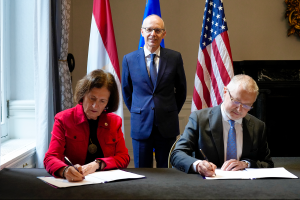Berkeley Space Center and the University of Luxembourg have signed a memorandum of understanding to advance collaborative research and education in space science and technology, in the presence of Prime Minister Luc Frieden, during a working visit in San Francisco. The agreement establishes a framework for cooperation between the two institutions over the next five years.
They plan to cooperate in several key areas of mutual interest:
- Digital Space Infrastructures: Developing advanced satellite and space communications systems, space systems engineering, mission-critical software systems, and ground segment technologies.
- Space Robotics and Autonomous Systems: Advancing autonomous technologies for space exploration and operations, leveraging expertise from both institutions in robotics and AI.
- Space Law and Policy: Exploring the legal frameworks governing space activities, bringing together UC Berkeley’s legal and policy expertise and the University of Luxembourg’s leadership in commercial space regulation.
The institutions will explore joint research projects, conferences, workshops, and symposia, while creating avenues for exchange of researchers, including faculty, graduate students, and postdoctoral scholars. The collaboration also aims to explore opportunities for joint education, innovation, entrepreneurship, and incubation and acceleration activities in the space sector, connecting Berkeley Space Center with Luxembourg’s thriving space ecosystem.
Dr. Victoria Coleman, Associate Provost for the Berkeley Space Center, noted that the agreement exemplifies the power of international collaboration to advance the frontiers of space technology. “By connecting UC Berkeley’s research excellence with Luxembourg’s dynamic space ecosystem—and doing so in the presence of Prime Minister Luc Frieden—we are laying the groundwork for transformative discoveries in digital infrastructures, autonomous systems, and space governance,” she said. “Together, we are preparing the technologies and talent that will shape humanity’s next chapter beyond Earth.”
‟ Luxembourg’s space sector is thriving, benefiting from the presence of over 80 companies and research institutions that drive innovation and scientific excellence. Luxembourg will remain committed to fostering collaboration, both with industry and internationally. Today’s MoU marks an important step toward deeper ties between Luxembourg and the Berkeley Space Centre, strengthening our ecosystems and opening new opportunities for research and entrepreneurship.”
The anticipated collaboration builds on Luxembourg’s strategic position as a European hub for space innovation and UC Berkeley’s long-standing leadership in aerospace research and education. By linking Berkeley Space Center with Luxembourg’s space ecosystem, opportunities for researchers and students would arise on both sides of the Atlantic to work on cutting-edge challenges in space technology.
About Berkeley Space Center
Berkeley Space Center is a proposed, 36-acre innovation centre at NASA Ames in the heart of Silicon Valley where academia, private industry and government come together to identify, incubate and launch tomorrow’s technological breakthroughs. Areas of focus include aerospace, advanced aviation, quantum computing and data science, disaster resilience, extreme environments, advanced materials and manufacturing, and other deep technology disciplines. Partnerships and research collaborations have already been established in advance of the physical development.
About the University of California, Berkeley
The University of California, Berkeley, is the world’s premier public research institution, consistently ranked as the top public university in the United States. UC Berkeley fuels a perpetual renaissance, generating unparalleled intellectual, economic and social value. UC Berkeley integrates research with teaching, the artistic with the scientific, the scholarly with the athletic, and the up-and-comer with the advantaged. Its diverse and kinetic community draws inspiration from every discipline, sparks dynamic interactions, and produces revelations about the world we aspire to live in. With the drive to ask critical questions and embrace new challenges, UC Berkeley is redefining itself and the role of a university in a changing world.
